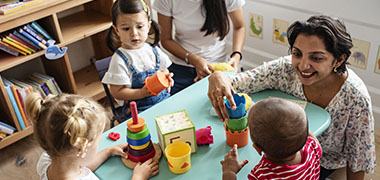
Courses for beginners
There is 1 course available in Brisbane Queensland for beginner learners with no prior experience or qualifications.
Doctor of Medicine
- There are no mandated entry requirements.


Courses for experienced learners
There are 2 courses available in Brisbane Queensland for experienced learners with prior experience or qualifications.
Bachelor of Medical Science
- There are no mandated entry requirements.
 Griffith University
Griffith University
Bachelor of Science (Biomedical Science)
- There are no mandated entry requirements.
 The University of Queensland
The University of Queensland
Key questions
How can I become a paediatrician?
To become a paediatrician in Brisbane, you may want to consider completing the Bachelor of Medical Science. This qualification will equip you with the skills and knowledge necessary for a career in this industry.
Are there training providers in Brisbane?
You can train to become a paediatrician by completing a qualification with Griffith University. Find a course provider near you. Once you make an enquiry, a course advisor will get in touch to discuss your study options and course fees.
What study modes are available?
There are several campuses within the Brisbane area that provide paediatrician training. The closest campus is 4km away from the center of Brisbane. Find a course provider that best suits your study needs.
Related occupations
Explore related occupations in the paediatrician sector.
Medical Laboratory Technician
A Medical Laboratory Technician performs tests on bodily fluids and tissues to assist in diagnosing medical conditions while maintaining patient confidentiality.
Laboratory Attendant
A Laboratory Attendant performs various tasks in medical or research labs, assisting staff, collecting samples, and preparing reports while ensuring safety and accuracy.
Laboratory Technician
A Laboratory Technician operates specialist equipment in medical or research labs, conducting tests and assisting with research while ensuring accuracy and safety.
Laboratory Assistant
A Laboratory Assistant conducts tests and collects samples in scientific settings, ensuring accuracy, safety, and effective teamwork while using specialised equipment.
Laboratory Supervisor
A Laboratory Supervisor manages lab operations, ensures procedures are followed, meets targets, and oversees staff while maintaining safety and accuracy.
General Practitioner
A General Practitioner provides medical care by diagnosing conditions, treating patients, and referring them to specialists as needed.
Surgeon
A Surgeon performs surgical procedures for various medical issues, specialising in areas like emergency or heart surgery while collaborating with healthcare professionals.
Dermatologist
A Dermatologist specialises in diagnosing and treating skin issues, prescribing medications, and liaising with patients and other health professionals.
Psychiatrist
A Psychiatrist diagnoses and treats mental health issues, prescribing therapies and medications while collaborating with healthcare teams.
Cardiologist
A Cardiologist is a medical doctor who diagnoses and treats heart conditions, monitoring patient progress and providing follow-up care.
Neurologist
A Neurologist diagnoses and treats nervous system disorders, conducting examinations and developing treatment plans to improve patients' quality of life.
Medical Laboratory Scientist
A Medical Laboratory Scientist performs tests on specimens to diagnose diseases, analysing samples and collaborating with healthcare professionals to ensure accurate patient care.
Medical Scientist
A Medical Scientist performs lab research and diagnostic tests to aid in disease diagnosis and treatment, collaborating with healthcare professionals.
Medical Researcher
A Medical Researcher advances healthcare by designing experiments, analysing data, and collaborating on clinical trials.
Immunologist
An Immunologist studies the immune system to diagnose disorders, develop new treatments, and improve vaccines for public health.
Geneticist
A Geneticist studies genes and heredity to analyse genetic disorders and develop treatments, conducting experiments and interpreting complex data.
Laboratory Scientist
A Laboratory Scientist conducts experiments, tests samples, and ensures quality control in labs, contributing to medical and scientific advancements.
Clinical Laboratory Technician
A Clinical Laboratory Technician performs vital tests and procedures to support patient diagnosis and treatment in healthcare.
Molecular Geneticist
Molecular Geneticists study genes at a molecular level, conducting experiments and analysing data to understand genetic mutations and develop therapeutic methods.
Epidemiologist
An Epidemiologist analyses disease patterns in populations, designs studies, and develops strategies to improve public health outcomes.
Medical Advisor
A Medical Advisor offers medical expertise to support healthcare products, overseeing trials, ensuring compliance, and disseminating information.
Laboratory Analyst
A Laboratory Analyst conducts tests and analyses on samples to ensure compliance with standards, while specialising in areas like chemistry or microbiology.
Laboratory Manager
A Laboratory Manager ensures efficient lab operations, manages staff and equipment, oversees budgets, and ensures compliance with safety and regulatory standards.
Endocrinologist
Endocrinologists diagnose and treat hormonal disorders, focusing on conditions like diabetes, thyroid imbalances, and infertility.
Medical Practitioner
Medical Practitioners, or GPs, diagnose and treat health issues in various settings, requiring strong organisational and interpersonal skills.
Medical Science Liaison
A Medical Science Liaison communicates scientific knowledge to healthcare professionals, supports clinical development, and offers insights on medical trends.
Career Medical Officer (CMO)
A Career Medical Officer provides comprehensive patient care, diagnoses conditions, manages treatment plans, and collaborates with healthcare teams.
Further reading


5 jobs for people who like working with children
31st August 2021)
